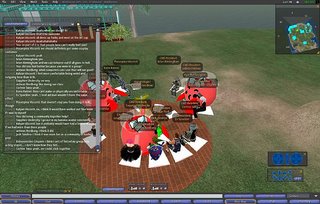Show notes:
- Sheryl is a technology and education consultant and adjunct instructor in the School of Education at The College of William and Mary, and she was one of the organizers of the recent K12 Online Conference.
- Right now, Sheryl believes, we are in a place where computing in the classroom is really going to take off.
- She feels that it is a moral responsibility of teacher-leaders in the school to figure out how to access the tools of the web and help students to learn to use them in a safe environment. (Again, I'm fascinated with the contrast of Larry Cuban's views here, and also with the apparent difficulties that grass-roots technology efforts face in school decision-making.)
- "You can't give away what you don't own." Until school administrators are experiencing the benefits of the new technologies, there cannot be more widespread adoption of them. (This touches on the point above.)
- The students of today don't have a choice as to whether or not they will master the skills of the read/write web (and being collaborative and self-driven)--if they don't, they will be left behind in the work world.
- The magic of Web 2.0 in schools is individual growth toward the sense of being "self-actualized:" students can be transformed by being able to write things that others are interested in reading, and by being able to collaborate with others.
- The "Golden Question" right now is: can tie these new tools to student achievement? She believes it they can be, but it's very hard to measure because of all the other variables.
- Sheryl points out the need for balance: when you use any pervasive educational strategy (not just the new computer technologies), you need to make sure that there is a marriage between the passion that is generated with a rigorous education. This should be a deepening of learning, and be challenging. "Rigor and passion."
- Many students are going to be coming to school already well versed in the read/write or participatory web. Her experience has been that they are often motivated learners from these experiences.
- Sheryl talks about moving from the "Information Age" to the "Age of Conceptualization." I'm not sure I know what the "Age of Conceptualization" is...
- The most gifted students are good at the way school is played right now, and they can have the hardest time adjusting to a learning environment that is cooperative and self-directed. It is the kids who have struggled previously that really benefit the most by being able to use these technologies. (This goes along with Sheryl's desire to bring computing resources to homeless youth, and her belief in how important this will be for them. See below.)
- She sees more of the writing tools being used in the classroom--blogs and wikis--but not as much podcasting.
- The real skill needed by teachers and students will be the ability to be our own "digital age librarian," knowing how to access, select, and synthesize all of the available information. We need to tap into the power of "self-directed interest."
- On homeless or transient children: she is a living example of breaking the cycle of generational poverty. If we don't empower these children with the same technologies that the affluent child will get at home, then we are trapping them in their poverty. Homeless children move around a lot, and often the teachers are unaware of the true situation at home. After the interview, Sheryl and I talked at length about creating a program for teacher mentoring to homeless children, and the providing of computing resources at homeless shelters (see www.PublicWebStations.com).
- Her blog is 21stcenturylearning.typepad.com.
Listen to the the Interview in MP3 format
Listen to the Interview in Vorbis OGG format
Not sure how to listen MP3/OGG files? Use the free VLC Media Player--works on Linux, Windows, and Mac.









